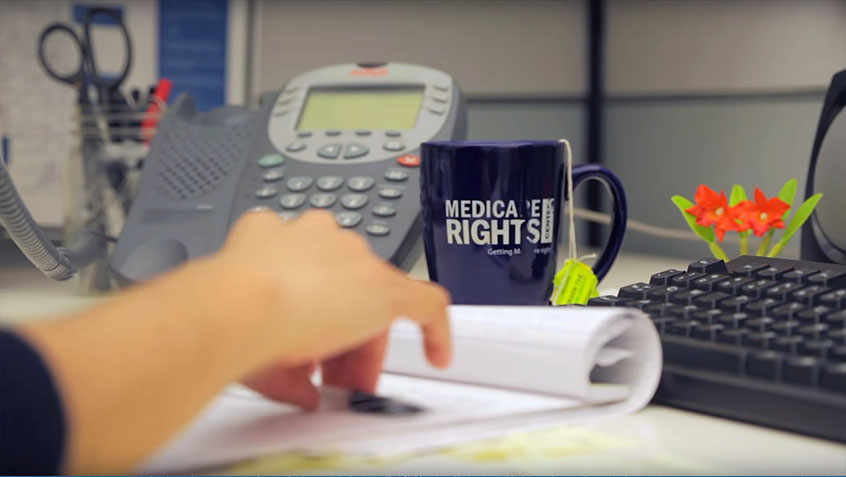Join Us Live for a Discussion on Medicare, Democracy, and the Future of Health Care
Medicare Rights Annual Trends Report Outlines Key Challenges Facing People with Medicare

This week, the Medicare Rights Center released our annual helpline trends report, Medicare Trends and Recommendations: An Analysis of 2020-2021 Call Data from the Medicare Rights Center’s National Helpline. Drawn from our direct experience with beneficiaries and their caregivers, including through our national helpline and online reference tool, the report outlines key challenges facing people with Medicare and recommends ways to improve the program.
In 2020 and 2021, Medicare Rights staff and volunteers addressed nearly 42,000 questions through the helpline while Medicare Interactive (MI), our online Medicare reference tool, fielded more than 5.5 million questions. Several key trends stood out, including:
- Medicare enrollment and affordability challenges, often exacerbated by COVID-19
- Difficulty appealing Medicare Advantage (MA) and Part D denials
- Problems accessing and affording prescription drugs
- The need for a comprehensive Medicare dental benefit
In the coming weeks, we will examine each theme in Medicare Watch. We begin with the report’s first trend, mitigating COVID-19’s impact on Medicare enrollment and affordability.
Medicare Enrollment, Affordability, and COVID-19
In 2020-21, calls related to enrollment and affordability comprised 52% of Medicare Rights’ total helpline questions, a 21% increase over 2019. While enrollment questions are always common, COVID-19 brought a new urgency to the topic.
Callers often needed help due to pandemic-related employment changes such as layoffs, reductions in work, and the termination of employer-sponsored health benefits. All expressed concerns about the immediacy of their coverage during this uncertain time. For some, there was no quick remedy; they had to wait until the next General Enrollment Period to sign up. Although some were eligible for the Part B Special Enrollment Period (SEP), which can allow for more timely enrollments, that application process was uniquely challenging: the closure of Social Security offices and employer human resources departments often meant paperwork and processing delays.
We also saw a pandemic-related increase in the number of individuals seeking assistance with Medicare costs, driven in part by unexpected layoffs and reductions in income. For example, there was an increase in inquiries surrounding the Qualified Medicare Beneficiary (QMB) program, which helps enrollees cover Medicare costs, including Part B premiums and cost-sharing. In 2019, 68% of Medicare Rights’ low-income program inquiries and referrals were QMB-related, while 74% were in 2020.
Medicare Improvement Opportunities
While most people new to Medicare are automatically enrolled because they receive Social Security when they become eligible, a growing number are not. These individuals must actively enroll, taking into consideration specific timelines, complex Medicare rules, and their existing coverage. Far too many people make honest mistakes when trying to navigate this confusing system. The consequences of such missteps are significant and may include lifetime late enrollment penalties, higher out-of-pocket health care costs, and gaps in coverage and access.
The pandemic increased the likelihood of these experiences as it caused more Medicare-eligible individuals to unexpectedly face urgent, complicated enrollment decisions during a time of great stress and upheaval. Those same disruptions—like job loss, illness, and increased caregiving obligations—also reduced incomes, making Medicare cost assistance and affordability protections ever more critical.
Yet, eligibility rules and administrative systems remain woefully outdated, leaving many who need help paying for Medicare with nowhere to turn. For example, the QMB program has restrictive income and asset limits in most states, leaving many beneficiaries who need help just outside of the eligibility range. At the same time, the lack of an out-of-pocket (OOP) cap in Original Medicare and Part D leaves beneficiaries far too exposed to financial risk. While Medicare Advantage plans have an OOP maximum, the threshold is too high.
The consequences of these two factors can be dire. People who cannot access care, whether because they do not have coverage or cannot afford to pay for care, are more likely to avoid medical treatment. This can undermine health and financial security by leading to worse outcomes and higher costs in the future.
Policy Recommendations
To improve Medicare enrollment, Medicare Rights strongly supports the BENES 2.0 Act (S. 3675). This commonsense, bipartisan bill would require the federal government to notify people approaching Medicare eligibility about basic enrollment rules, which would help prevent costly enrollment errors. In addition, we support better remedies to mistaken delays in Part B enrollment, including through increased use of equitable relief and limits to the amount and/or duration of the Part B late enrollment penalty.
To improve affordability, we support easing access to Medicare’s low-income assistance programs by eliminating asset tests, easing income eligibility thresholds, and modernizing burdensome application processes. We also support establishing a standardized, affordable OOP cap across the program, while also addressing the underlying drivers of high and rising health care and prescription drug costs.
Together, these changes would begin to improve the access to and affordability of Medicare coverage and modernize the program for current and future generations.
Read the report, Medicare Trends and Recommendations: An Analysis of 2020-2021 Call Data from the Medicare Rights Center’s National Helpline.
Read more about recent state actions to improve access to assistance programs.
Show Comments
We welcome thoughtful, respectful discussion on our website. To maintain a safe and constructive environment, comments that include profanity or violent, threatening language will be hidden. We may ban commentors who repeatedly cross these guidelines.
Help Us Protect & Strengthen Medicare
Donate today and make a lasting impact
More than 67 million people rely on Medicare—but many still face barriers to the care they need. With your support, we provide free, unbiased help to people navigating Medicare and work across the country with federal and state advocates to protect Medicare’s future and address the needs of those it serves.
The Latest
Most Read
Add Medicare to Your Inbox
Sign up to receive Medicare news, policy developments, and other useful updates from the Medicare Rights.
View this profile on InstagramMedicare Rights Center (@medicarerights) • Instagram photos and videos









